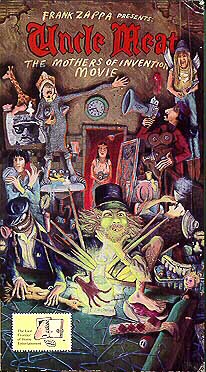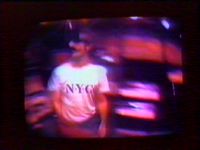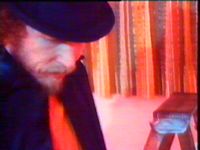Release Info
Barfko-Swill/MPI #MP 4002 (VHS)
Video For Nations VFN 11 (VHS)

Video (English VFN 11) was packaged with Honker "No-D" glasses (source: Kier)
Release date
Copyright
PA-682-902
Title: Uncle Meat : the Mothers of Invention movie / produced and directed by Frank Zappa.
Description: Videocassette ; 1/2 in.
Note: Music video.
Claimant: Zappa Family Trust
Created: 1987
Published: 15Sep87
[...]
VA-567-772
Title: Frank Zappa presents Uncle Meat—the Mothers of Invention movie.
Description: Video sleeve.
Claimant: acHonker Home Video (employer for hire)
Created: 1988
Published: 15Jan88
Uncle Meat
MPI MP 4002
01/31/1989
UNCLE MEAT (a Mothers Of Invention film that has been 20 years in the making) is just about to be released. What's holding that up right now is that Cal Schenkel is finishing the painting that's going to be used for the cover of the jacket.
The Story Of The Movie
In March 1970, Frank invited a whole crowd of us to Todd-AO, a post-production facility, to see the latest version of his film, Uncle Meat, mostly stuff in the Vienna Woods and the Festival Hall. To tie it all together, he needed to interview each of the Mothers, but there lay the nub: the Mothers of Invention no longer existed.
[...] Frank called the band together a second time and once again, they herded into the basement. If Frank noticed the hostility which hung thick and heavy in the room, he chose to ignore it.
"What I propose to do," he told them, bringing his coffee to the rocking chair, "is interview each of you in turn. Then I'll use those interviews to connect the various parts of the film we already have."
"How much do we get paid?" Jimmy Carl Black demanded to know.
"You don't," Frank said, "No one's getting paid. It's already cost me twelve thousand dollars before we start."
The general response was along the lines of, "Well, fuck that."
"You'll get food and expenses," Frank said, trying for a compromise.
Jim, Bunk, Roy and Art sprang up, voices clashing, clearly furious that Frank was using them yet again just so he could swell his ever-growing fortune. Only Don Preston, Motorhead and Ray Collins remained and agreed to take part.
So the script of Uncle Meat had to be quickly rewritten and Frank dictated it over my shoulder directly into the typewriter. He'd already hired lights and aquipment and bought film. The action began on 30 March in Frank's basement.
Haskell Wexler, a cinematographer who'd won an Oscar for Who's Afraid of Virginia Wolf?, had offered five days of services—free. He'd made a film, Medium Cool, in 1968, a documentary for which he'd used Frank's songs "Oh No" and "Who Needs the Police Corps?" on the soundtrack. [...]
Aynsley Dunbar arrived from London to add teen appeal to Frank's new line-up. A devilishly handsome, Jack-the-lad rock'n'roll drummer, he would stay at Frank's house for ten months.
HF: As we understand it, your movie, "Uncle Meat," has gone through a lot of evolving.
Z: Yeah, and as soon as I can get some money we can get it done. Now it's about some little girl getting hot over Mike [Don] Preston.
HF: With old Mothers, won't it be out of date?
Z: No. Originally it was about all freaks in America being led away to concentration camps and getting their heads shaved. Including the Mothers. The head fascist was some fat headed computer-brained Colonel Sanders who sat in his office shooting chickens, all the while riding in the glove compartment of a Chicken Little truck.
HF: Why didn't you do it?
Z: Because this mustache is six years old and I didn't want to cut it. It's not over yet though. We'll see.
So what I'm doing now is I'm working on a movie, because in between rehearsing this group of Mothers that's playing at the Fillmore and getting this stuff ready for the Philharmonic, I've been in the editing room working on Uncle Meat all this time. [...] We were shuffling around, trying to make a deal just to get any money to finish the film off. So we were lucky. We got a small amount of money to do this job. Then we got luckier and Haskell Wexler shot for us for a week for free.
To provide us with some continuity. It turns out that the continuity that he was supposed to shoot would have been interviews with all the members of the Mothers, past, present, and future, and so on and so forth, and documentary-type stuff that will help to explain the mythology of, the validity of, or even the existence of us and this music. But we had a business meeting with the Mothers, just prior to that week of shooting, and there was a whole bunch of arguments and bullshit and hysteria. Four of the guys decided they wanted to have nothing whatsoever to do with any of the projects. That radically changed my plans for that week's shooting, which I had all blocked out. So two days before we were supposed to go—we had already hired the crew and had the lights and the stock bought and all that shit—to the tune of about maybe $12,000 for the week. Even though Haskell was free, the stuff that goes with him costs you some money. So I said, "Oh, what am I going to do here?" I made up a chart, which is really quite intriguing, but it's so involved—I've already cut about a half an hour of the film. We had a screening of it for the money people, just before we came out here. They were very distressed. They said, "That's not the movie that you told us you were going to make." And one of the other guys says, "Why, that's horrible. It's so dull." It's not going to be very easy to please those guys.
The story line that came out revolves around Don Preston, who is always turning into a monster; Phyllis [Altenhaus], who used to be Tom Wilson's secretary at MGM, who is now my editor's assistant on the film—who falls in love with the monster because she sees him on the screen with a machine everyday; Aynsley Dunbar, who likes to get beaten with toilet brushes, and wears a vibrator on a strap as part of his band uniform; and Motorhead and Calvin who have formed a group which consists of a guitar that doesn't play and cymbals. I had the cymbals plugged with a pair of pliers, Motorhead has wings and a hat and Calvin has a tin reflector off of a photographer's bulb that he wears for a thing. They like to play at the Hollywood Ranch Market in the kitchen utensil department; Tom Wilson, who's running for President in 1972, and Suzy Creamcheese, who wants to be the First Lady. Those are the characters in the story. Now the way the story unfolds so far—because there's still plenty of things that can happen—sometimes you see me directing the people and telling them what to say, so there's no differentiation between what the story is, who the people are, what they're pretending to be and what they really are, or what they're trying to make you think the whole thing is. You know, it's all laid out there in such a way that each one of the supposed dramatic sequences is prefaced by either a rehearsal or a verbal explanation of what the action is. I say, "We're going to do this. You just watch what happens." And then we do it. After it's been done, we say, "We did that. Then we're going to do this"—you know? The continuity is really funny because there's no time—it's all happening all at once, even though the events took place over a period of, let's say, from now back five years, plus into 1972. That's the timespan covered by the film, but it's all condensed into ninety minutes, which is all happening simultaneously. I can see why those guys who put up the money wouldn't get into it.
It's going to be a theatrical release. It's designed as a Cinemascope, four-track stereo feature film. [The old Mothers Footage is] integrated in there too, because—that's why I say it covers a timespan from now to five years back. All those things help to explain the phenomenon of Don Preston turning into a monster. [...] He sticks his tongue—we call it "transforming"—he sticks his tongue on the side of his face, squints one eye, the other one pops open, his face blows out like that and he hunches his shoulder. It's just like the Phantom of the Opera. He goes zooot and there he is. He does it every place—airports, you know, out in the street. Don is transformed, and he goes like this—and people go "Oooh!" When we were on the road before, it got to be a fad to see whether or not everybody could learn how to transform. He does it the best, because he had a lot of practice. Using that as one of the thematic elements of a film—the idea that somebody turns into a monster and the reasons why he does it—it changes throughout the film. Mostly he turns into a monster whenever he hears the word "royalties."
[...] The other funny thing about the movie is the constant reference to the MGM royalties. It's so funny, because Phyllis used to be a secretary at MGM and Tom Wilson used to be a producer at MGM. Another one of the themes in the film is a rubber chicken. We describe events as we're using a chicken to measure it. At one point we're measuring the MGM royalties with a chicken. Ray Collins does that. He comes up with a royalty statement which consists of a certain amount of foam which is expelled from the blowhole of the rubber chicken. He says, "Yes, I think we have some royalties coming now." It's very avant-garde.
[...] It has a completion date of July 1, with the idea of a release as soon as you can talk somebody into sticking it in a theatre, I guess. Other people who have seen that first screening think that it's going to be too hard to get it into a theatre. They think the distributors are probably of the same mentality as the people who put up the money.
[...] I buy a block of [studio] time and I go in with a certain amount of prepared material. Then I always allow for accidents, ideas, craziness, spontaneous whatever, and I'm willing to pay for that extra studio time just to get those things down on tape. Like an improvised dialogue between Aynsley Dunbar and Phyllis [Altenhaus], happened one night in the studio—where he's trying to get her to beat him with some kind of device in the studio. They're just discussing it. Because I took the time to record that, it gave me one of the elements for the plot in the film. Also I came up with a funny tape.
[...] The manner in which the film is being assembled is being put together using the same intellectual processes I would use to put together a piece of music; the same mechanism, the same ordering system. So it's a piece of music. It just so happens that it makes use of pictures and other stuff—sound effects, talking.
[...] I did animation for it. This kind of animation—single frame moving—the title sequence consists of two white gloves that crawl across my desk, fuck each other and appear later on the shelf in the bathroom. That's the opening. That's the first one you see. What you see first is the film that came out of my camera, which is shooting the glove—which cuts to Haskell shooting me shooting the gloves in the bathroom. The sound that's heard over the picture is coming out of my camera, which is taking place in another area, it's the ringing echo of this bathroom and the noise that goes like that little motor on the camera as it shoots one frame. It's really strange.
Uncle Meat is still sitting in the basement and I don't have any money to finish it. There's about fifty to sixty minutes of cut footage and probably another five hours of dailies that I haven't done anything to.
What happened to 'Uncle Meat'?
It's still in my basement—fifty minutes rough cut of it—it's not completely shot yet. It has some music in it already and some animation has been done for it—I did it—it's like miniatures.
Frank also divulged that he's working on another movie—"but it's too far in the future for me to start promoting it now."
He would say, however, that it was a "monster movie"—including perversion, hamburgers, a children's belt with little yellow holes, and dry ice—"any movie that's any good has dry ice in it. I'm cutting it now—most of it was actually shot in 1970, before 200 Motels."
FZ on Sounds (Australian TV, 1983)
I'm finishing a movie that I started 14 years ago. [...] This movie was begun before we did 200 Motels. [...] I left it alone for a number of years because the material itself was tied up on a lawsuit and it was locked up in a vault under the control of another person. And when the lawsuit was resolved I got all the material back and decided I would finish it off.
Uncle Meat is incomplete. Fifty minutes of it are edited, but I don't have enough money to finish it.
UNCLE MEAT REVISED BUDGET
100 EDITING EQUIPMENT
101 1 moviola 650.00
102 1 double headed moviola 270.70
103 3 moviescope viewers 167.00
104 3 splicers 200.00
105 3 syncranizers 332.00
106 3 large trim bins 110.00
107 1 kem 6900.00
108 purchases: lamps, split reels, etc. 1800.00
subtotal 10429.70
contingency 300.00
total 10729.70
200 EDITING
201 editing salaries 8335.00
202 technical assistanc 1000.00
203 production salaries (Suz. & Phyliss) 7200.00
204 editing room rental 1535.00
205 payroll taxes 1712.00
total 19782.00
300 SOUND
301 transfer 5 hrs. sound from tape
master to 35 mag. master (include
mixdown from 12 to 4) 7100.00
302 transfer 5 hrs. mag. master(35) to 16mag. 400.00
303 mix-4 track stereo 8000.00
304 transfer sound effects 400.00
305 dubdown 908.00
306 transfer 35 mag. to 35 optical 609.00
contingencies 2000.00
19417.00
400 Sub CONTRACTED WORK
401 optical and titles 7500.00
402 optical stock process printing 3000.00
403 negative cutter 4000.00
404 projection time 500.00
total 15000.00
500 LABORATORY
501 workprinting & coding 20200.00
502 4180 ft. FAP 16 mmm. 800.00 ? 12,000 (8000)
total 21000.00
600 MUSIC RELEASES 7000.00
700 COST TO BLOW UP AN D FAP WITH STEREO
701 25 min.-2,500 double image 3000.00
702 30 min.-3,000 single image 3000.00
703 30 min.-3,000 original image 900.00
704 5 min.-500 ft. 16 mm. to 35 480.00
705 additional blow up 5000.00
706 mag. stripping 4 tracks 158.00
707 transfer 194.00
708 contingency 668.00
total 13400.00
800 SHOOTING FOOTAGE
801 original cost 16400.00 spent need (4700)
802 daily 990.00 2000 1000
total 17390.00
900 SHOOTING RENTAL
901 2-35 mm. rentals 920.00
902 sound 570.00
903 lights 510.00
total 2000.00
1000 SOUND TRANSFER (plane 2000.00
tickets)
1100 cameraman
1101 extra crew and actors 4000.00
Sherwood Preston (4000)
1200 stock footage 5000.00 500 500
1300 phone serv. and misc. 1239.00
UNCLE MEAT REVISED BUDGET RECAP
100 EDITING EQUIPMENT
101 1 moviola 650.00
102 1 double headed moviola 270.70
103 3 moviescope viewers 167.00
104 3 splicers 200.00
105 3 syncranizers 332.00
106 3 large trim bins 110.00
107 1 kem 6900.00
108 purchases: lamps, split reels, etc. 1800.00
subtotal 10429.70
contingency 300.00
total 10729.70
200 EDITING
201 editing salaries 8335.00
202 technical assistanc 1000.00
203 production salaries (Suz. & Phyliss) 7200.00
204 editing room rental 1535.00
205 payroll taxes 1712.00
total 19782.00
300 SOUND
301 transfer 5 hrs. sound from tape
master to 35 mag. master (include
mixdown from 12 to 4) 7100.00
302 transfer 5 hrs. mag. master(35) to 16mag. 400.00
303 mix-4 track stereo 8000.00
304 transfer sound effects 400.00
305 dubdown 908.00
306 transfer 35 mag. to 35 optical 609.00
contingencies 2000.00
19417.00
400 Sub CONTRACTED WORK
401 optical and titles 7500.00
402 optical stock process printing 3000.00
403 negative cutter 4000.00
404 projection time 500.00
total 15000.00
500 LABORATORY
501 workprinting & coding 20200.00
502 4180 ft. FAP 16 mmm. 800.00 ? 12,000 (8000)
total 21000.00
600 MUSIC RELEASES 7000.00
700 COST TO BLOW UP AN D FAP WITH STEREO
701 25 min.-2,500 double image 3000.00
702 30 min.-3,000 single image 3000.00
703 30 min.-3,000 original image 900.00
704 5 min.-500 ft. 16 mm. to 35 480.00
705 additional blow up 5000.00
706 mag. stripping 4 tracks 158.00
707 transfer 194.00
708 contingency 668.00
total 13400.00
800 SHOOTING FOOTAGE
801 original cost 16400.00 spent need (4700)
802 daily 990.00 2000 1000
total 17390.00
900 SHOOTING RENTAL
901 2-35 mm. rentals 920.00
902 sound 570.00
903 lights 510.00
total 2000.00
1000 SOUND TRANSFER (plane 2000.00
tickets)
1100 cameraman
1101 extra crew and actors 4000.00
Sherwood Preston (4000)
1200 stock footage 5000.00 500 500
1300 phone serv. and misc. 1239.00



